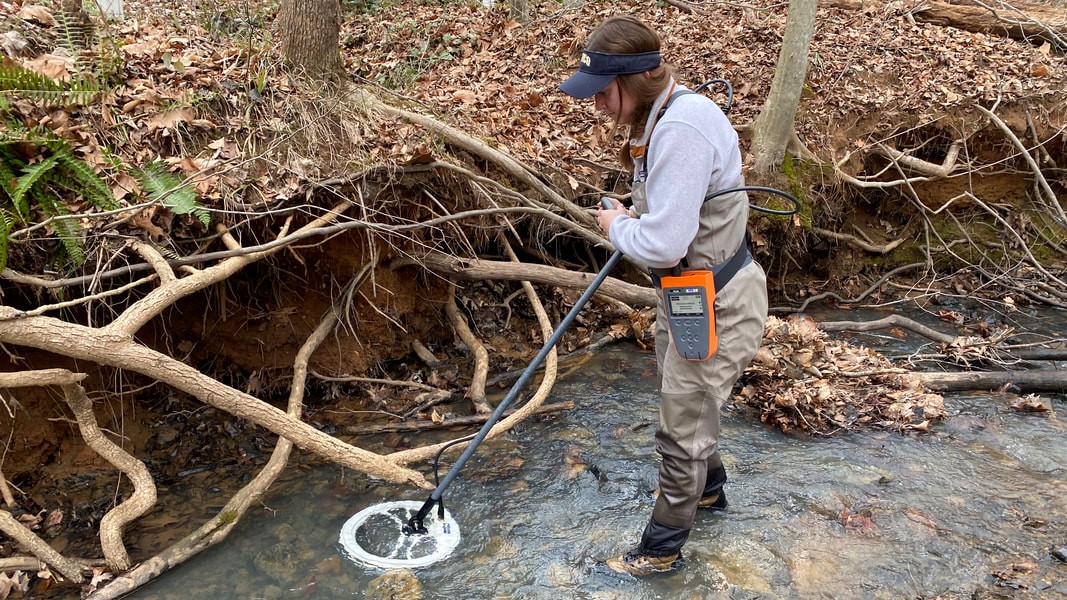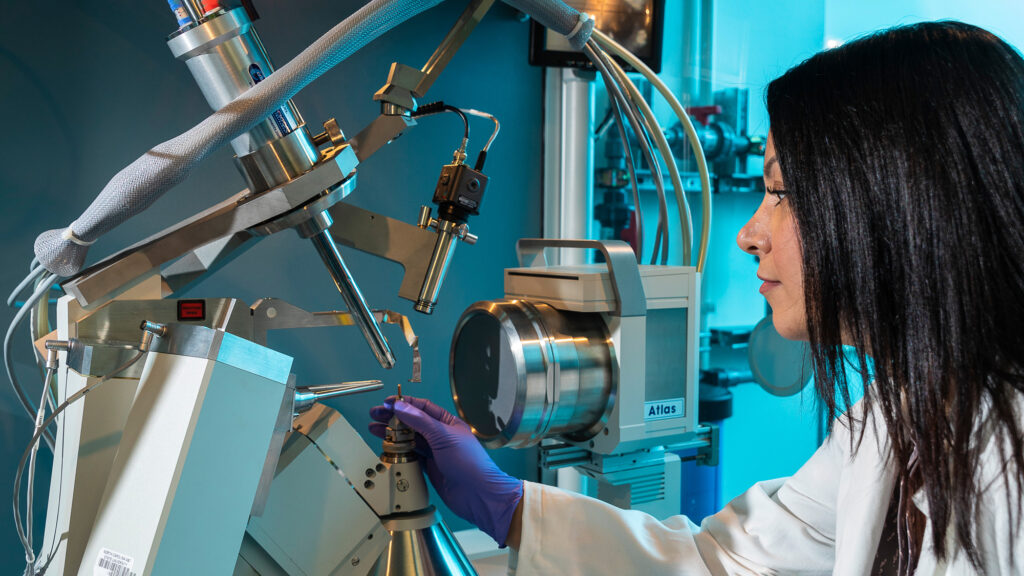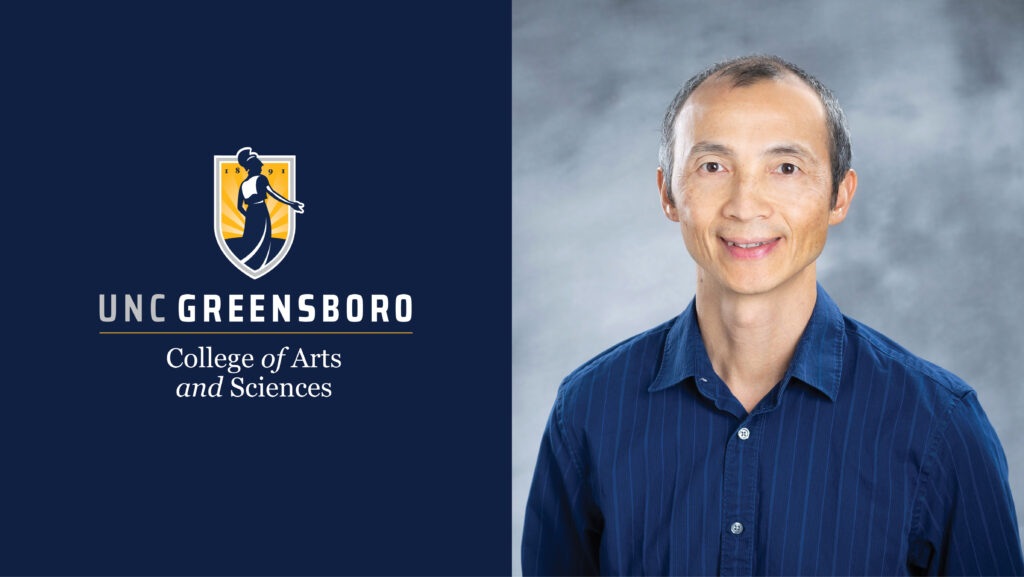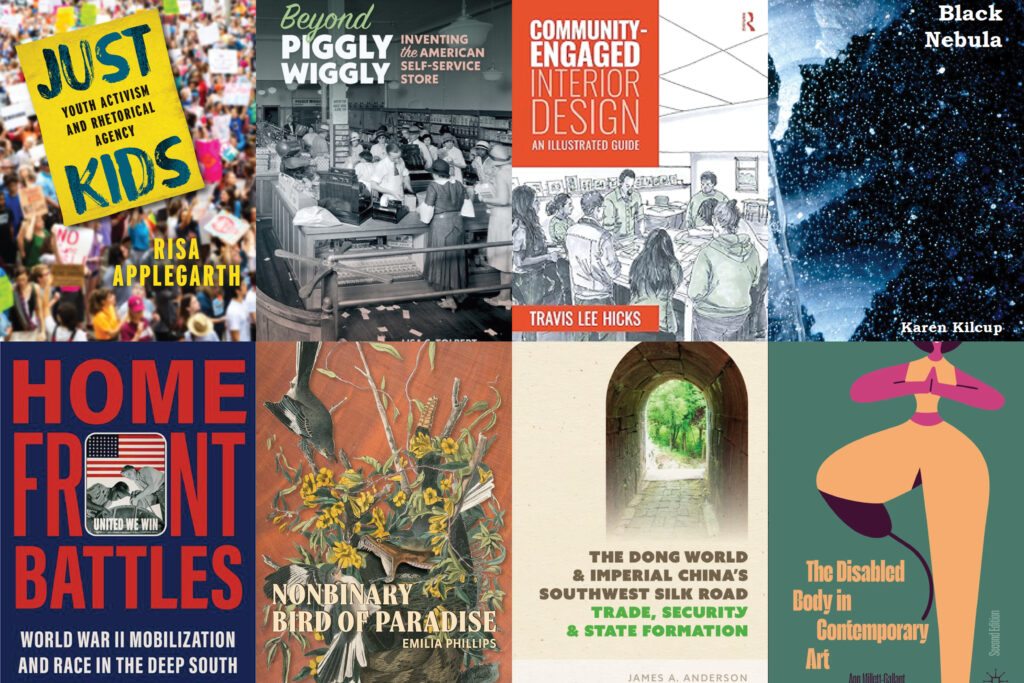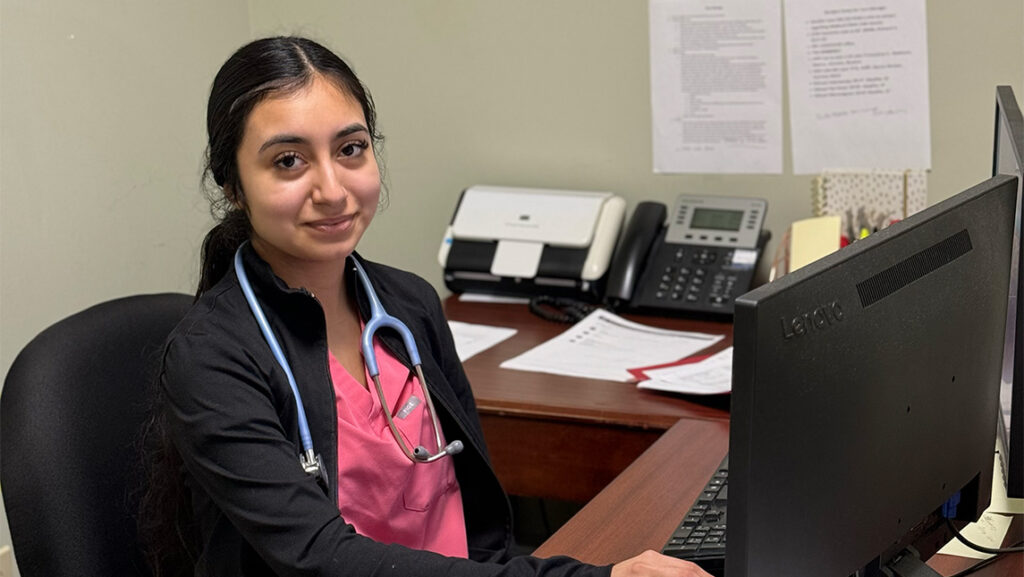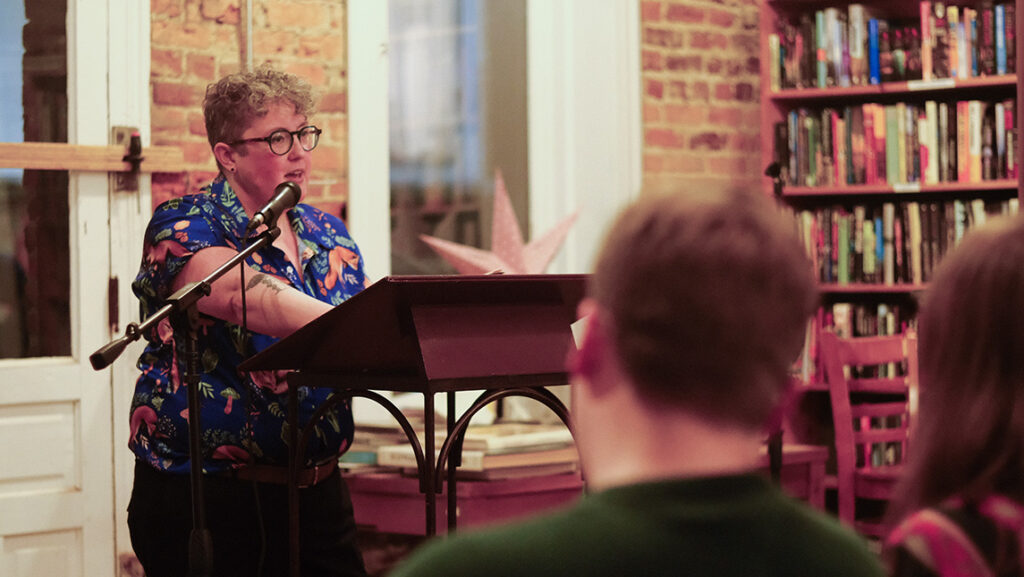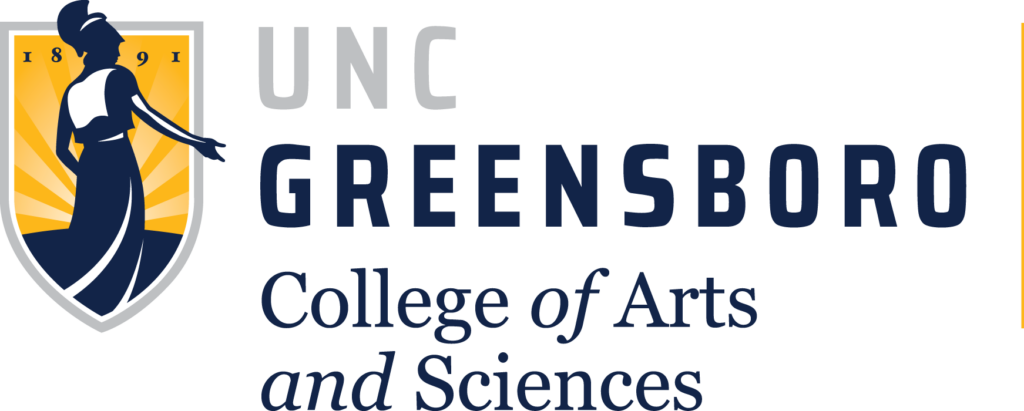In the 2023-24 academic year, the College of Arts & Sciences Office of Research supported 20 UNCG students with nearly $20,000 in grants from the Dorothy Levis Munroe Research Fund. The fund was endowed by alumna Dorothy Levis Munroe ‘44 to support student research in the “natural and mathematical sciences.”
All 20 students conducted research in STEM departments: twelve in Biology, four in Chemistry and Biochemistry, two in Computer Science, and one each in Mathematics and Nanoscience. Students won support by submitting a research proposal and project budget up to $1000, depending on their project needs. Five Munroe grant recipients were undergraduate students, fourteen were graduate students, and one was a post-bacc student.
The list of items purchased with Munroe funds shows the diversity of research undertaken by these student scientists. They used award funds to purchase:
- 250 Pine seedlings, 144 bluestem grass plugs, potting soil, and pots
- Dissecting scissors, nets, an aquarium bubbler, and a heavy-duty wagon to haul these and other tools needed for collecting and tagging fish in streams across central NC
- Carbon nanotubes to study DNA uptake of duckweed
- Fluorescent Yellow Particles and Fetal Bovine Serum for research into the uptake of microplastics by human endothelial cells, which line the inside of our blood vessels.
- Kits for genetic analysis in experiments with the drought-resistant grain tef
- Chemical reagents and organic solvents
- Lab supplies such as Erlenmeyer Flasks and well plates.
Munroe grants also supported travel by students to conduct research and attend conferences and scientific meetings. Their work took them to places near and far, including:
- Fieldwork in Morganton and Elizabeth City, NC to study the ecology of chigger mites.
- Fieldwork in South Africa’s Kruger National Park to study the effects of drought, fire, and extreme grazing on grasslands.
- Fieldwork in the Gateway Research Park and at UNCG’s Plant and Pollinator Center.
- Fieldwork at the Konza Prairie Biological Station in Kansas to study grassland recovery following nitrogen cessation in areas previously subject to chronic nitrogen addition.
- NVIDIA’s GTC 2024, one of the top Artificial Intelligence conferences, to gain insights to improve a project developing new processes for clinical trial recruitment.
- The Wildlife Society’s annual conference, to present a poster on phylogeography and flea community ecology of the long-tailed ground squirrel.
- The International Computing and Combinatorics Conference, to share a paper titled “Improved Sourcewise Roundtrip Spanners with Constant Stretch.”
- The Joint Mathematics Meetings, to share mathematical research into ecological models of species interactions.
- The North Carolina Academy of Science annual meeting, where the student won the John Bowley Derieux Research Award.
Many of the students also participated in UNC Greensboro’s Graduate Research & Creativity Showcase of Scholarship or in the Thomas Undergraduate Research & Creativity Expo, where they presented posters or gave oral presentations.
Dorothy Levis Munroe graduated as a chemistry major from UNCG in 1944, along with her twin sister Katheryne Levis McCormick. Munroe went on to earn a master’s in chemistry, teach high school mathematics for many years, and become the first woman to serve on the board of education in Newark, Delaware. By endowing this fund at UNCG, Munroe hoped to encourage students to pursue the sciences by providing resources for their research.
In their final reports, the students expressed their gratitude for the Munroe grant and the impact it made on their scholarship and career. Below are selections from a few student reports.
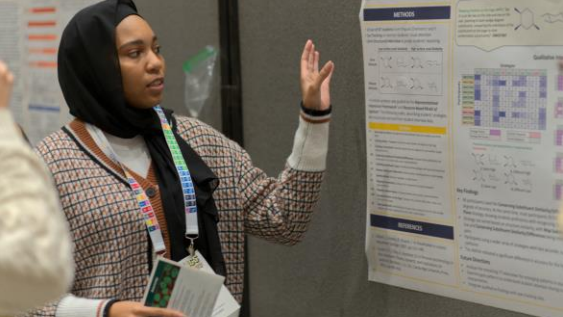
- “Skills that I have acquired include interacting with data in meaningful ways, qualitative coding, scientific literature interpretation and discussion, and data analysis. Moreover, I have observed and participated in a scientific collaborative community that has enabled me to gain confidence in myself as a student, scientist, and researcher.”
~ Amala Jones, Senior, Biology major
- “In the preparation of a ‘camera-ready’ draft of my paper, the distillation of my work into a short academic presentation, the act of presenting my work, and the attendance of talks by senior and upcoming researchers in the field, I gained a lot of valuable experience. Specifically, the breadth of topics covered in this event opened my eyes to the subfields that could most influence my own, as well as numerous real-world applications of this mainly theoretical field of study, including city planning, networking, and drug discovery.”
~ Eli Stafford, Senior, Computer Science - “While this list [of items purchased with Munroe funds] appears to be made up of many small things, they all have a large impact on the success of my work. Fieldwork is unpredictable which can be one of the exciting drivers to do it, but it can also be frustrating if you are not prepared. Luckily with the purchase of these items, my fieldwork can be successful, and the unpredictable stressors can be minimized.”
~ Ashley LaRoque, PhD candidate, Environmental Health Science
- “After reception of the Munroe Grant, I was able to outline and establish experimental designs for my aims, with the knowledge of the supplies I would be able to afford due to the influx of additional funding. …This aim of my research would not have been possible without the financial support of the Dorothy Levis Munroe Student Research Grant Program.”
~ Jordan Winter, PhD candidate, Environmental Health Science
- “Attending this conference proved incredibly beneficial for both my professional development and the advancement of our research project. We specifically chose this conference because it is a chance to connect with AI experts and enthusiasts from around the world. Throughout the conference, I engaged with esteemed professionals in our field, presenting and discussing our research project. These interactions … provided me with constructive feedback that has significantly contributed to the refinement and enhancement of my research.”
~Sony Annem, Masters candidate, Computer Science - “The funds afforded to me for this research went towards purchasing the dirhodium catalyst, materials to synthesize Ph-HIAT, Stang’s Reagent, and solvents utilized for purification. Also, this research gave me the opportunity to present at two poster presentations. I am deeply appreciative of the opportunities afforded to me thanks to this grant provided by the university.
~ Christina Wiswell, PhD candidate, Chemistry - “Attending the TWS conference was an essential moment for me, not only professionally but also personally. As I transition from academia to the workforce upon completing my studies at UNCG, this experience served as an indispensable platform for networking and learning. I had the privilege of connecting with professionals from esteemed organizations such as the U.S. Department of Agriculture (USDA) and the United States Geological Survey (USGS), gaining valuable insights into potential career pathways within these institutions.”
~Amanda Reyes, PhD candidate, Environmental Health Sciences - “To summarize, the Dorothy Munroe Student Research Grant provided me with the funds to purchase the necessary materials to prepare for the upcoming growing season, during which I will be starting my experiment. I am incredibly thankful for these funds as I would not be able to have an experiment of this size without them.”
~Shelby Williford, PhD candidate, Environmental Health Sciences - “We have effectively utilized the allocated budget to carry out the proposed tasks, and we express our sincere gratitude for the Munroe foundation for the generous support.”
~ Abreham Alemu, PhD candidate, Environmental Health Science
The College is also grateful Dorothy chose to help UNC Greensboro students pursue their love of science.
2023-2024 Dorothy Levis Munroe Research Fund Award Recipients
Chelsea Akabueze, Senior, Biology (Gideon Wasserberg, mentor)
Abreham Alemu, PhD candidate, Environmental Health Science (Ayalew Osena, mentor)
Sony, Annem, MS candidate, Computer Science (Yingcheng Sun, mentor)
Rachel Brenneman, PhD candidate, Environmental Health Science (Kim Komatsu, mentor)
Williamjosh Brown, Senior, Chemistry & Biochemistry (Jonathan Chekan, mentor)
Olivia Chapman, PhD candidate, Enivronmental Health Science (Bryan McLean, mentor)
Brianna Gomez, Senior, Biochemistry (Eric Josephs, mentor)
Noah Holland, MS candidate, Biology (Gideon Wasserberg, mentor)
Amala Jones, Senior, Biology (Maia Popova, mentor)
Ajmal Khan, PhD candidate, Environmental Health Science (Zhenquan Jia, mentor)
Ashley LaRoque, PhD candidate, Environmental Health Science (Akira Terui, mentor)
Dustin Nichols, PhD candidate, Statistics (Ratna Singham Shivaji, mentor)
Maggie O’Daniel, post-bacc, Pre-Med (Ayalew Osena, mentor)
Amanda Reyes, PhD candidate, Enivronmental Health Science (Bryan McLean, mentor)
Eli Stafford, Senior, Computer Science (Chunjiang Zhu, mentor)
David Tanas, PhD candidate, Chemistry (Mitch Croatt, mentor)
Rosalie Terry, PhD candidate, Environmental Health Science (Sally Koerner, mentor)
Shelby Williford, PhD candidate, Environmental Health Science (Kevin Wilcox, mentor)
Jordan Winter, PhD candidate, Environmental Health Science (Jim Coleman, mentor)
Christina Wiswell, PhD candidate, Chemistry (Mitch Croatt, mentor)
Featured photo: PhD student Ashley LaRoque uses a PIT device to detect tagged fish. Photo provided by Ashley LaRoque.
